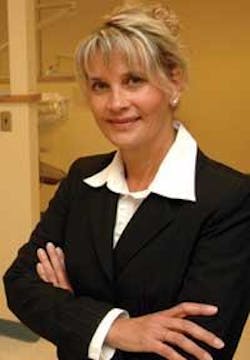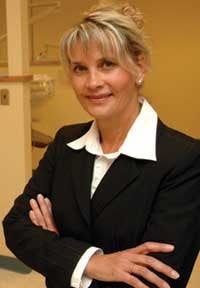Careers in research
by Christine Nathe, RDH, MS
[email protected]
This month's spotlight focuses on the career of a dedicated researcher with a public health agenda who helps broaden the science upon which dental hygiene practice is built. Gayle McCombs, RDH, MS, currently is an associate professor and the director of the Old Dominion University Dental Hygiene Research Center.
She has published several research papers and has spoken on numerous topics. Professor McCombs has also won quite a few research awards. We recently discussed her career and here are a few of her thoughts.
How did you decide to pursue dental hygiene as a career?
“After working as a dental assistant for many years and observing the dental hygienist in the office, I decided that I wanted to advance my career. While in dental hygiene school, one of my instructors was very instrumental in formulating my life's goals. Unfortunately, after graduation, she became very ill with cancer. One day while I was visiting her in hospice, she made me promise that I would continue my education and become a teacher.
“For the next 10 years, while working in private practice, I pursued my bachelor's degree, and I ended up teaching in the Florida and South Carolina community college systems. As time went by, I wanted to broaden my professional options. I decided to press on for a master's degree at the University of North Carolina-Chapel Hill. It was during graduate school that I was introduced to clinical research. Throughout the program, the mentorship and support I received from professors Rebecca Wilder and Steven Offenbacher, in addition to the experience I gained, shaped my career.”
Did you need additional education or credentials for dental hygiene research?
“My research foundation was acquired in graduate school; however, most of my practical experience is a result of working as a research faculty member at UNC-CH. Learning how to manage and coordinate clinical trials involves a great deal of organizational skill. In addition to sponsor and governmental regulations, there are professional and ethical responsibilities that must be adhered to.
“Numerous continuing education courses and workshops in clinical trial management are offered through agencies such as: the National Institutes of Health (NIH), the Food and Drug Administration (FDA), the pharmaceutical industry, local universities, and by private clinical research training organizations such as the Society of Clinical Research Associates (SoCRA). There are also various online training opportunities to become certified or obtain specialty training in topics such as monitoring, regulatory affairs and clinical trial design and management.”
What is the most valuable piece of advice you can give?
“Be adaptable, self-motivated, and have the capability to be a leader, as well as a team player.”
What do you think the future holds for this field?
“I believe it is wide open for those individuals who are interested in research. When our graduate students complete the program, they have no problem finding employment. I think one of the most rewarding aspects of my job is getting students energized about research. I mentor students who are fearful of the process and then watch as they become excited about research once they realize they can be successful.”
Do you have any suggestions for others who may be considering research as a career?
“My suggestion to those who would like to follow this path would be start out simple. Volunteer for a study, take a course, shadow someone in research, search the Internet, and read your professional journals. Seek out someone who is involved in clinical research and observe for a day or two to see if this is something that sparks your interest.”
Professor McCombs exemplifies a dental hygiene scholar with a focus on building the knowledge base of our profession and practice!

